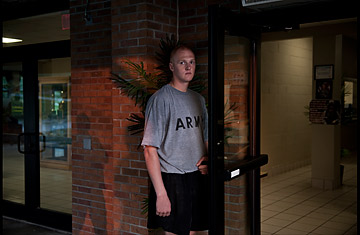
A recruit at Fort Jackson holds open the door to the mess hall during breakfast hours.
(8 of 8)
Would a return to the draft help? It certainly would bind the American public more closely to its troops and would perhaps induce a deeper sense of service in more of its citizens. It would surely reduce the number of military conflicts and shorten those the nation elected to fight. But it would also create a less capable, less well trained, less professional force; the nation would be less confident in its ability to project power overseas and protect its interests once forces arrived. In any case, the public and military hate the idea. In last month's Pew poll, 68% of veterans and 74% of the public opposed its return. "The nation is better served by an all-volunteer force," Army General Martin Dempsey (whose three children have served in the Army) said at his July confirmation hearing to serve as Chairman of the Joint Chiefs of Staff. He wants "to find ways to preserve it in an era of fiscal constraint rather than move at this point to a draft." But he added that "we need other options for the nation when we enter into conflict that can escalate and that can take longer than we thought."
Can the nation reconnect to its military? Alex Lemons, who will soon be attending graduate school at Reed College in Portland, Ore., hopes so. The onetime scout sniper believes the gap between the guardians and the guarded is itself a threat to our national security. "The military is ultimately a reflection of our culture--or what we would like to believe about our culture," he says. "But when the burden of fighting wars involves only 1% of our citizens and their families, it's not good for them--or the country."
